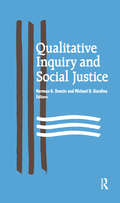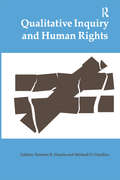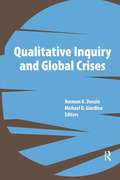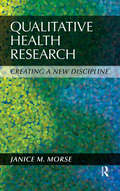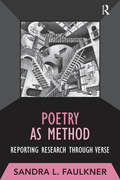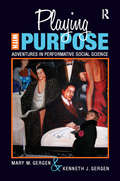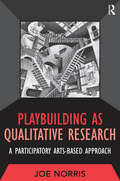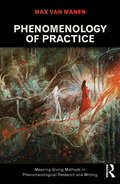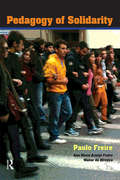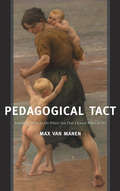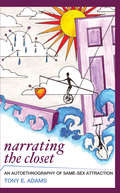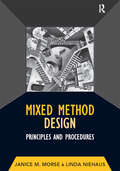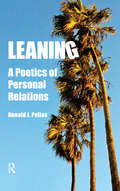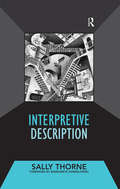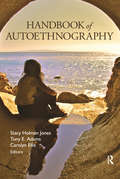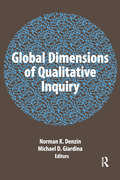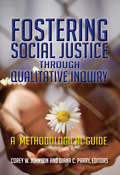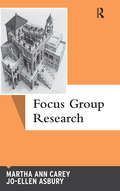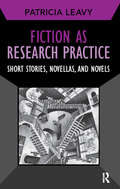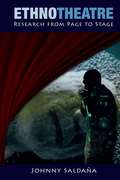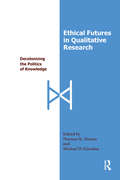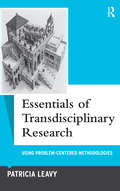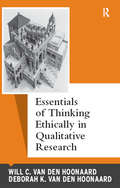- Table View
- List View
Qualitative Inquiry and Social Justice: Toward a Politics of Hope (International Congress of Qualitative Inquiry Series)
by Norman K Denzin Michael D GiardinaIn increasing numbers, qualitative researchers are leaving their ivory tower perches and entering the fray, focusing their research and actions on the promotion of social justice. In this tightly edited volume of original articles stemming from the 2008 International Congress on Qualitative Inquiry, leading figures in qualitative research demonstrate the potential for the research tradition to make contributions to the betterment of humankind.
Qualitative Inquiry and Human Rights (International Congress of Qualitative Inquiry Series)
by Norman K. Denzin Michael D. GiardinaQualitative researchers are increasingly being called upon to become human rights advocates, to help individuals and communities honor the sanctity of life, and to promote the core values of privacy, justice, freedom, peace, and human dignity. In this volume of plenary papers from the Fifth International of Qualitative Inquiry in 2009, leading qualitative researchers show the various dimensions of the human rights work being done by scholar/activists in the social sciences, education, health care, social services, cultural studies, and other fields.
Qualitative Inquiry and Global Crises (International Congress of Qualitative Inquiry Series)
by Norman K. Denzin Michael D. GiardinaThis plenary volume from the Sixth International Congress on Qualitative Inquiry (2010) highlights the variety of roles played by qualitative researchers in addressing global communities in crisis. It shows how qualitative researchers can bridge gaps in cultural and linguistic understanding to address issues of disparity in race, ethnicity, gender, and environment in the interests of global social justice and human rights. Authored by many of the world’s leading qualitative researchers, the signature articles in this volume point qualitative researchers toward a research stance of ethics, meaning, and advocacy.
Qualitative Health Research: Creating a New Discipline
by Janice M MorseThe leading figure in qualitative health research (QHR), Janice M. Morse, asserts that QHR is its own separate discipline—distinct from both traditional health research and other kinds of qualitative research—and examines the implications of this position for theory, research, and practice. She contends that the health care environments transform many of the traditional norms of qualitative research and shape a new and different kind of research tradition. Similarly, the humanizing ethos of qualitative health research has much to teach traditional researchers and practitioners in health disciplines. She explores how the discipline of QHR can play out in practice, both in the clinic and in the classroom, in North America and around the world. A challenging, thought-provoking call to rethink how to conduct qualitative research in health settings.
Poetry as Method: Reporting Research Through Verse (Developing Qualitative Inquiry #6)
by Sandra L FaulknerThis book takes an interdisciplinary approach to using and creating poetry for conducting and reporting social research. It includes examples of poetry, interviews of poets, and practical exercises that will enhance the discussion of poetry writing as a method. When used as a teaching guide this book will encourage students to consider the importance of form and function in poetry for qualitative methods. It also answers the question of how to teach the creation and evaluation of poetry, it combats the perception that poetry is too difficult or mysterious to use as research and that only poets should be concerned with poetic craft.
Playing with Purpose: Adventures in Performative Social Science (Writing Lives: Ethnographic Narratives #12)
by Mary M Gergen Kenneth J GergenDistilling decades of work spanning their prestigious careers, Mary M. and Kenneth J. Gergen make a strong case for enriching the social sciences through performative work. They present a unique exploration of the origins of performative social science and provide an intellectually rich overview of its significance in the field, as well as its evolving potential. Many of their own performance pieces are included in the volume. The authors envision a broadening of the social sciences, making it more accessible to non-experts and opening up new dialogues between society and science—and changing the world in the process. Social scientists and researchers will gain a valuable new perspective from this insightful tome.
Playbuilding as Qualitative Research: A Participatory Arts-Based Approach (Developing Qualitative Inquiry #5)
by Joe NorrisThis book is for both art-based researchers and research-informed artists, exploring the theatrical genre known as Collective Creation, or Playbuilding. Performers generate data around chosen topics— from addiction and sexuality to qualitative research—by compiling scenes from their disparate voices. Audience members become involved in the investigation, and the performed scenes do not end the conversation but challenge and extend it. Through discussion and audience participation, the process examines how knowledge is defined and how data is mediated.
Phenomenology of Practice: Meaning-Giving Methods in Phenomenological Research and Writing (Developing Qualitative Inquiry #13)
by Max Van ManenMax van Manen offers an extensive exploration of phenomenological traditions and methods for the human sciences. It is his first comprehensive statement of phenomenological thought and research in over a decade. Phenomenology of practice refers to the meaning and practice of phenomenology in professional contexts such as psychology, education, and health care, as well as to the practice of phenomenological methods in contexts of everyday living. Van Manen presents a detailed description of key phenomenological ideas as they have evolved over the past century; he then thoughtfully works through the methodological issues of phenomenological reflection, empirical methods, and writing that a phenomenology of practice offers to the researcher. Van Manen's comprehensive work will be of great interest to all concerned with the interrelationship between being and acting in human sciences research and in everyday life. Max van Manen is the editor of the series Phenomenology of Practice, https://www.routledge.com/series/PPVM
Pedagogy of Solidarity (Qualitative Inquiry and Social Justice #4)
by Paulo Freire Ana Maria Freire Walter de OliveiraFamous Brazilian educational and social theorist Paulo Freire presents his ideas on the importance of community solidarity in moving toward social justice in schools and society. In a set of talks and interviews shortly before his death, Freire addresses issues not often highlighted in his work, such as globalization, post-modern fatalism, and the qualities of educators for the 21st century. His illuminating comments are supplemented with commentaries by other well-known scholars, such as Ana Maria Araujo Freire, Walter de Oliveira, Norman Denzin, Henry Giroux, and Donaldo Macedo.
Pedagogical Tact: Knowing What to Do When You Don’t Know What to Do (Phenomenology of Practice #1)
by Max Van ManenPedagogical Tact describes how teacher-student relations possess an improvisational and ethical character. The daily realities of educators, parents, and childcare specialists are pedagogically conditioned by sensitive insights, active thoughtfulness, and the creative ability to act caringly and appropriately in the immediacy of the moment. Internationally known educator Max van Manen shows through recognizable examples and evocative stories how good teaching is driven by the phenomenology of pedagogy. His book-refocuses educators and others away from an emphasis on instrumental skills and technocratic programs toward the need for pedagogical tact;-describes how pedagogical actions have latent effects that will influence children throughout their lives;-shows how our actions with young people have pedagogically ethical and moral significance;-gives educators back their original vocational motivation and inspiration.
Narrating the Closet: An Autoethnography of Same-Sex Attraction (Writing Lives: Ethnographic Narratives)
by Tony E AdamsMotivated by the death of his partner, Adams seeks to redefine the closet as a relational construct between all people and all sexualities. The closet is explored at each stage—entering it, inhabiting it, and coming out of it—and strategies are offered for reframing difficult closet experiences. Adams makes use of interviews, personal narratives, and autoethnography to analyze lived, relational experiences of sexuality. This is a must have for scholars and students of gender studies, qualitative research, and for any reader who has felt the closet’s reach.
Mixed Method Design: Principles and Procedures (Developing Qualitative Inquiry #4)
by Janice M MorseThe use of mixed methods designs for conducting research has become a major trend in social science research. Renowned methodological experts Janice Morse and Linda Niehaus present a guide to intermediate and experienced researchers on the possibilities inherent in mixed method research. They offer the basic principles of conducting this kind of study, then examine a wide variety of design options available to the researcher, including their strengths and weaknesses and when to use them. Providing examples from a variety of disciplines, examining potential threats to validity, and showing the relationship between method and theory, the book will be a valuable addition to the methodologist’s library and a useful text in courses in research design.
Mixed Method Design: Principles and Procedures (ISSN)
by Janice M MorseThe use of mixed methods designs for conducting research has become a major trend in social science research. Renowned methodological experts Janice Morse and Linda Niehaus present a guide to intermediate and experienced researchers on the possibilities inherent in mixed method research. They offer the basic principles of conducting this kind of study, then examine a wide variety of design options available to the researcher, including their strengths and weaknesses and when to use them. Providing examples from a variety of disciplines, examining potential threats to validity, and showing the relationship between method and theory, the book will be a valuable addition to the methodologist’s library and a useful text in courses in research design.
Leaning: A Poetics of Personal Relations (Writing Lives: Ethnographic Narratives)
by Ronald J PeliasRonald J Pelias explores leaning as a metaphor for analyzing interpersonal interaction. Bodies leaning toward one another are engaged, developing the potential for long-lasting, meaningful relationships. But this ideal is not often realized. Pelias makes use of a wide variety of tools such as personal narrative, autoethnography, poetic inquiry and performative writing in his exploration of the physical space of relationships. This deeply personal work is essential for scholars and students of qualitative research and autoethnography.
Interpretive Description: Qualitative Research For Applied Practice (Developing Qualitative Inquiry Ser. #2)
by Sally ThorneThis book is designed to guide both new and more seasoned researchers through the steps of conceiving, designing, and implementing coherent research capable of generating new insights in clinical settings. Drawing from a variety of theoretical, methodological, and substantive strands, interpretive description provides a bridge between objective neutrality and abject theorizing, producing results that are academically credible, imaginative, and clinically practical. Replete with examples from a host of research settings in health care and other arenas, the volume will be an ideal text for applied research programs.
Handbook of Autoethnography
by Stacy Holman Jones Tony E. Adams Carolyn EllisIn this definitive reference volume, almost fifty leading thinkers and practitioners of autoethnographic research—from four continents and a dozen disciplines—comprehensively cover its vision, opportunities and challenges. Chapters address the theory, history, and ethics of autoethnographic practice, representational and writing issues, the personal and relational concerns of the autoethnographer, and the link between researcher and social justice. A set of 13 exemplars show the use of these principles in action. Autoethnography is one of the most popularly practiced forms of qualitative research over the past 20 years, and this volume captures all its essential elements for graduate students and practicing researchers.
Global Dimensions of Qualitative Inquiry (International Congress of Qualitative Inquiry Series #8)
by Norman K. Denzin Michael D. GiardinaThis focused collection of original articles addresses the global dynamics of qualitative inquiry and the contextual dimensions within which such inquiry takes place. Contributions from many of the world's leading qualitative researchers in communications, education, sociology, and related disciplines focus on the changing landscape of social media, human rights, the Global South, and decolonizing methodologies, and guide the field toward a more engaged, global perspective. Chapters were developed from plenary sessions of the Eighth International Congress of Qualitative Inquiry (2012).
Fostering Social Justice through Qualitative Inquiry: A Methodological Guide
by Corey W Johnson Diana C ParryQualitative researchers increasingly flock to social justice research to move beyond academic discourse and aid marginalized communities and groups. This is the first textbook to address the methods of conducting qualitative research using a social justice paradigm. The book addresses the differences that a social justice stance requires from the researcher, then discusses how major qualitative methodologies are employed to create social justice in both the process and products of qualitative research. In this book-chapters cover grounded theory, phenomenology, ethnography, participatory action research, and other key qualitative designs;-methods chapters are written by experts in that methodology;-case studies illustrate show this style of research in action;-material is tightly organized and edited for course use although there are multiple authors.
Focus Group Research (Qualitative Essentials #9)
by Martha Ann Carey Jo-Ellen AsburyThis volume provides a thorough introduction to creating and conducting focus group research projects. Carey and Asbury provide background on the history of focus groups then document the best practices in conducting a study using them. They also provide valuable advice on how to conduct a fair and accurate analysis of minorities and other vulnerable groups within the population at large. This book is an excellent introduction for any researcher looking to utilize focus groups in their next project.
Fiction as Research Practice: Short Stories, Novellas, and Novels (Developing Qualitative Inquiry #11)
by Patricia LeavyThe turn to fiction as a social research practice is a natural extension of what many researchers and writers have long been doing. Patricia Leavy, a widely published qualitative researcher and a novelist, explores the overlaps and intersections between these two ways of understanding and describing human experience. She demonstrates the validity of literary experimentation to the qualitative researcher and how to incorporate these practices into research projects. Five short stories and excerpts from novellas and novels show these methods in action. This book is an essential methodological introduction for those interested in studying or practicing arts-based research.
Ethnotheatre: Research from Page to Stage (Qualitative Inquiry and Social Justice)
by Johnny SaldañaEthnotheatre transforms research about human experiences into a dramatic presentation for an audience. Johnny Saldaña, one of the best-known practitioners of this research tradition, outlines the key principles and practices of ethnotheatre in this clear, concise volume. He covers the preparation of a dramatic presentation from the research and writing stages to the elements of stage production. Saldaña nurtures playwrights through adaptation and stage exercises, and delves into the complex ethical questions of turning the personal into theatre. Throughout, he emphasizes the vital importance of creating good theatre as well as good research for impact on an audience and performers. The volume includes multiple scenes from contemporary ethnodramas plus two complete play scripts as exemplars of the genre.
Ethnotheatre: Research from Page to Stage (ISSN)
by Johnny SaldañaEthnotheatre transforms research about human experiences into a dramatic presentation for an audience. Johnny Saldaña, one of the best-known practitioners of this research tradition, outlines the key principles and practices of ethnotheatre in this clear, concise volume. He covers the preparation of a dramatic presentation from the research and writing stages to the elements of stage production. Saldaña nurtures playwrights through adaptation and stage exercises, and delves into the complex ethical questions of turning the personal into theatre. Throughout, he emphasizes the vital importance of creating good theatre as well as good research for impact on an audience and performers. The volume includes multiple scenes from contemporary ethnodramas plus two complete play scripts as exemplars of the genre.
Ethical Futures in Qualitative Research: Decolonizing the Politics of Knowledge (International Congress of Qualitative Inquiry Series)
by Norman K. Denzin Michael D. GiardinaEthics has been a perennial concern of qualitative researchers. The subject has been confounded with the emergence of human subjects regulations, the increased concern with indigenous communities, the globalization of research practices, and the breakdown of barriers between researcher and subject. The original contributions to this volume highlight the key topics that face contemporary qualitative researchers and those that will likely emerge in the near future. Written by many of the leading figures in the field—Lincoln, Denzin, Schwandt, Richardson, Ellis, Bochner, Morse, among others—this book will help shape the ethical response of the field to the challenges presented by the contemporary research environment.
Essentials of Transdisciplinary Research: Using Problem-Centered Methodologies (Qualitative Essentials #6)
by Patricia LeavyTransdisciplinary research is issue-driven, addressing contemporary social questions from a range of critical theoretical perspectives unhampered by the theoretical and methodological restrictions of traditional disciplinary boundaries. In this brief, informative guide, Patricia Leavy shows how a transdisciplinary approach can produce more effective results for researchers hoping to ameliorate social problems and foster social justice. Leavy demonstrates the value of transdisciplinary approaches in mixed methods design, and how trans approaches actually help fulfill the promises and goals of mixed methods research. She explains its relationship to multi-disciplinary and interdisciplinary research and its value in community-based and arts-based research projects. Providing the key principles and methods needed to conduct a transdisciplinary study, Leavy also offers numerous examples from multiple research sectors to show its effectiveness. Ideal as a brief introductory text for students engaged in this style of research.
Essentials of Thinking Ethically in Qualitative Research (Qualitative Essentials #10)
by Will C van den Hoonaard Deborah K van den HoonaardEthical dimensions of qualitative research are constantly emerging and shifting. This volume identifies relevant ethical principles that can guide novice researchers through the research process with the necessary wisdom and insight to shape a project in sound, meaningful, and thoughtful ways. Well known for their work in this area, the van den Hoonaards outline the domains on which ethics most often impinge. They address key ethical issues arising in different qualitative traditions and contexts. The volume concludes with guidance on how to navigate formal ethics reviews. Many key examples and other resources help the student engage the complicated literature on this topic.
